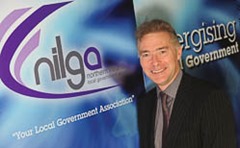A new opportunity
 Amid the tensions at Stormont, NILGA Chief Executive Derek McCallan looks forward to how the new councils will improve local democracy.
Amid the tensions at Stormont, NILGA Chief Executive Derek McCallan looks forward to how the new councils will improve local democracy.
Austerity, government reform and discord mean tension in the political sphere. The stakes are high and relationships between central and local government are at a crossroads. NILGA is the representative body for councils, working for enhanced, sustainable local government in Northern Ireland.
Municipalities the world over are cornerstones of democracy. The Scottish Parliament created in 1999, culminating 15 years later in the independence referendum, led to politically, economically and socially-driven devolution of power to Holyrood and to the 32 Scottish councils.
In New Zealand and the Netherlands, more than 75 per cent of the public purse is spent and co-ordinated by councils. Nearer to home, £5.3 billion of European social and structural funds will be distributed by 39 local enterprise partnerships in England. Birmingham City has responsibilities greater than the devolved Welsh Assembly. Councils are tasked with stripping away layers of top-down, command and control, institutional bureaucracy.
Councils here in many ways, are like their counterparts across the globe: accountable to a local public, highly knowledgeable, closer to the ground than other government bodies and institutions, and under daily pressure to provide brilliant services, either inexpensively or free, to a discerning and diverse population. Councils should not be add-ons or consultees of central government.
From April 2015, councils will deliver enhanced services. They’ve an enviable body of talent which has delivered high quality, cost-effective partnerships in areas like economic development, sports provision, urban and rural regeneration, food hygiene and recycling.
Yet our new local authorities are making provision – financial and legal – to safeguard against the negative cost impact of central government functions transferring. Impact – negative and positive – is inevitable. Cost-cutting is seen by some as an end in itself, but NILGA asserts that we need to move beyond that debate – to properly transform public service provision, for all.
Councils over the past three years – since reform reappeared in the Programme for Government – have shown remarkable resilience. They didn’t throw the baby out with the bath water, or even the off-street car parking out with the planning.
It may seem that councils which started with little in terms of services and spend are not getting much more; in fact they will have significantly more powers. They won’t control many services but they will have major influence over the way services are delivered.
This is what matters. It’s how it’s delivered (preferably really well and at modest cost) and where (preferably as close to one’s home, work or holiday location as possible). The association has developed an innovative and radical campaign to champion local people and places within a Programme for Local Government, as part of the new Programme for Government itself.
The next Programme for Government is due in 2016 when Assembly elections are scheduled. NILGA wants councils to be at the planning, negotiation and policy table, shaping priorities which will develop the services councils will be tasked with delivering over the following half decade. Mad? Ask the folk of New Zealand. Impossible? No. Ask the communities of the devolved Dutch. Eleven councils in combined, dynamic, political leadership should not be seen as a threat or waste of money. What is the price of better democracy?
NILGA continues to offer solutions to those with more resources and powers than councils, to take customer – not institution – led approaches to the business of government. The Programme for Local Government is a campaign and work plan, reflecting the challenge summed up by the American transformer of commerce and government Marshall Goldsmith: “After living with their dysfunctional behaviour for so many years, people become invested in defending their dysfunctions rather than changing them.”
The council review is a great opportunity for democracy. NILGA wants this review to be one small step towards bigger reform. All politics are local, and NILGA will continue to put the local into government. Great public service needs great public servants and the association and member councils are fit and ready. We’ve even beaten 16 other parts of Europe and won the 2015 European Entrepreneurial Region Award for Northern Ireland.
Let’s hope government at all levels is entrepreneurial and responsible, and takes the right (well-surfaced, well-lit, clearly-signposted, litter-free) road.





